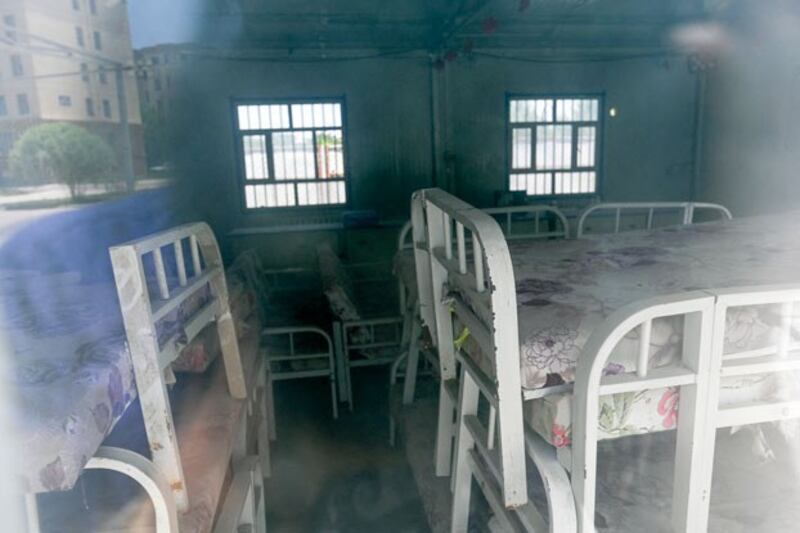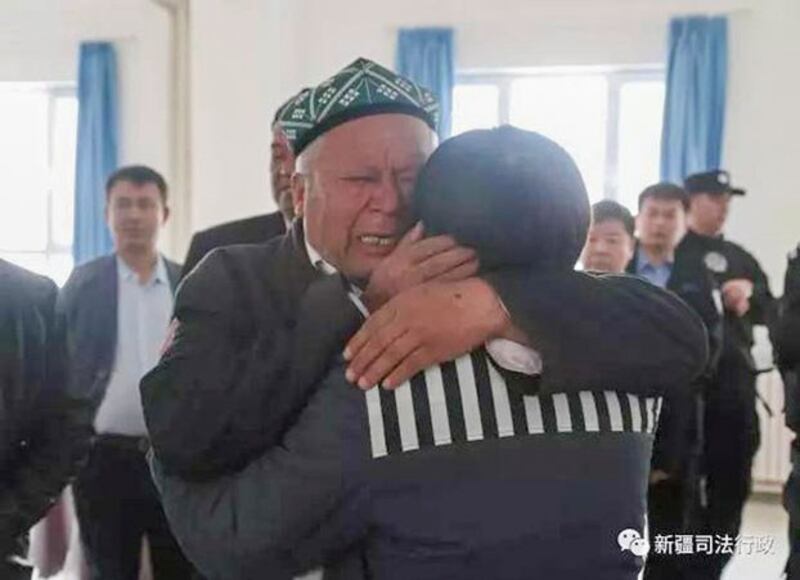Chinese authorities arrested an elderly Uyghur man after he couldn’t pay more than US$20,000 in fines for his two imprisoned sons, sources in Xinjiang told Radio Free Asia, in what appears to be a new layer of punishment imposed on the mostly Muslim group in northwestern China.
Mamtimin Yasin, a 70-year-old baker, was informed by a court in Xinjiang’s Hotan, which sentenced his sons in 2017 to 15 years in jail each for “religious extremism,” that he had to pay a fine of 150,000 yuan, or US$20,700, as part of their punishment, a person familiar with the situation said.
But he didn’t have the money, so court officials arrested him on April 29, said the person who declined to be identified for fear of retribution by authorities.
Officials are telling families of prisoners that their loved one’s sentences may be reduced if they pay the fines, saying that the amounts were originally included in court verdicts.
However, Yasin’s case is one of the first in which those who cannot pay the fine have been arrested.
“The first condition of the current policy for forgiveness in prisons is paying the imposed fine,” a Hotan county court officer told Radio Free Asia. “If they don’t pay the fine, then they fail to meet the condition.”
Under Chinese criminal law, verdicts must be served to the defendant, the defendant's lawyer and family members. But many families of detainees are unaware of the fines because court officers only inform them orally of the jail terms.
Reopened his bakery
Before his sons were arrested, Yasin spent three decades working as a baker in a small shop in Hotan county.
He retired in 2014 due in part to his age and deteriorating health, but later reopened the bakery to earn money for his medical needs, said the person familiar with the situation.
Yasin revived the business thanks to the support of his old customers.
But when court officials noticed his bakery was doing well, they demanded he pay the fine, said the person with knowledge of the situation.
When Yasin told them he couldn’t pay, they accused him of lying and took him away for questioning, he said.

Yasin hasn’t returned, and his shop remains closed, indicating that he is being detained for failing to pay court-imposed fines for his two imprisoned sons, the person said.
A Hotan county court officer contacted by Radio Free Asia confirmed Yasin’s arrest, citing a dispute with court officials who went to his bakery to collect the money.
The court’s Special Execution Division is responsible for collecting the fines, she said.
A Hotan district court official told RFA that prisoners’ relatives may face civil penalties if they do not pay the fines even though they have the means to do so.
However, she could not provide information about Yasin’s whereabouts or the exact nature of the civil penalty.
But a second official from the Hotan district court said people could not be locked up for failing to pay a fine.
When RFA inquired about Yasin’s case, the official said the baker was arrested for being uncooperative and causing trouble for the bailiffs.
“The punishment for not letting the law staff do their work properly is a civil penalty,” she said, adding that the penalty for such obstruction ranges from 15 days to six months of detention.
Yasmin was sentenced to civil detention and would be released after a short detention period, she added.
Another case
In a similar case, a Uyghur living overseas who is originally from Uchturpan county, or Wushi in Chinese, said authorities in Xinjiang told his elderly father to pay a penalty of 150,000 yuan to cover two 75,000 yuan, or US$10,300, fines imposed on his wife and sister.
Authorities arrested the two in 2017 and sentenced them to 15 years in jail for “religious extremism,” he said.
But his father, the only family member not in prison, could not afford to pay because he is ill and relies on relatives for support, the source said, adding that he heard the information through unofficial channels, but could not confirm it.
A clerk at the Uchturpan County People’s Court told RFA that some inmates’ families had to pay fines for imprisoned relatives.
“There is a fine associated with serving a sentence,” she said, adding that the amount depended on the nature of a prisoner’s “crime” and sentence length.
If the fine is paid, court authorities may shorten the prisoner’s sentence, she added.

An employee at the Hotan Prefectural Law and Justice Center told RFA that proof that fines were paid must be shown to the courts that issued the verdicts.
He said fines were sometimes included in verdicts, and that the amounts varied from 5,000 yuan. or US$700, to 1 million yuan, or US$138,000, depending on the seriousness of the crime and the length of the sentence.
“Paying the fine doesn’t guarantee an immediate release,” he added.
Not informed
Complicating the situation is that extrajudicial verdicts in closed court cases are seldom given to a prisoner's family, so that the relatives must go to the relevant court and ask about any fines, said the employee at the center.
“The court will not give them the verdict, but if they ask about the fine, they will be informed,” said the employee at the Hotan Prefectural Law and Justice Center.
He declined to say why court orders are not released to family members of those convicted of crimes.
A former Uyghur policeman who now lives in Sweden said authorities do this so that the families of those sentenced do not become belligerent.
“Only if it is an open court will they learn about it, or later learn it from the police stations,” he said. “This tactic of keeping verdicts secret is to threaten the families and prevent them from getting angry and starting to oppose.”
Authorities did not have enough time to hold trials or deliver verdicts to families during the mass arrest and detention of Uyghurs and other Turkic peoples beginning in 2017 in Xinjiang under the pretext of preventing “terrorism” and “religious extremism.”
A clerk at the Uchturpan County People’s Court said verdicts for those convicted of political crimes such as “extremism” are not given to their families.
The main reason is because Chinese authorities are still trying to conceal the detentions of more than a million Uyghurs in concentration camps and those sent to prisons with or without a trial, and don’t want the information to leak out of Xinjiang, the former policeman said.
“They are concerned that if numerous court actions are exposed, their lies will be revealed to the international community,” he said.
Translated by RFA Uyghur. Edited by Roseanne Gerin and Malcolm Foster.

